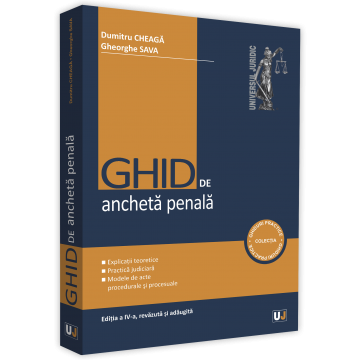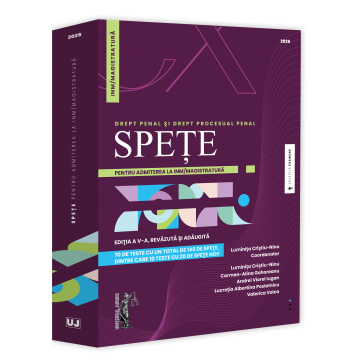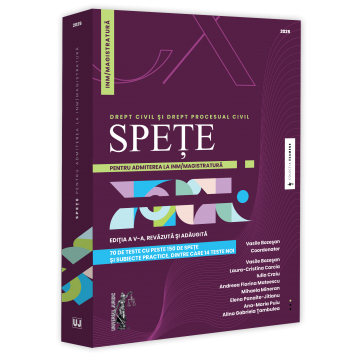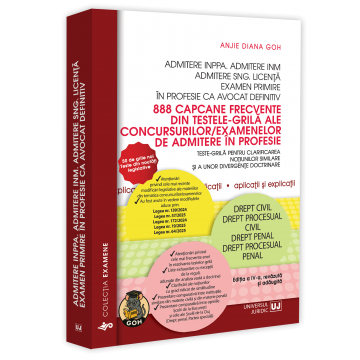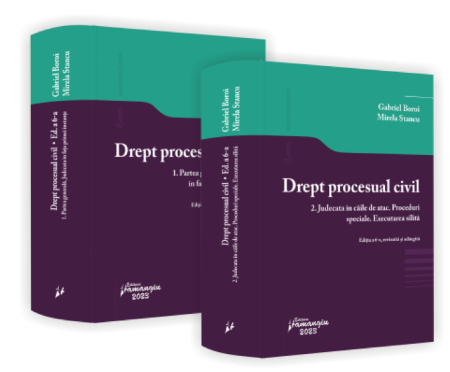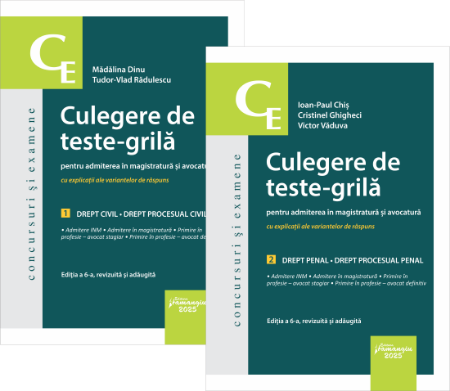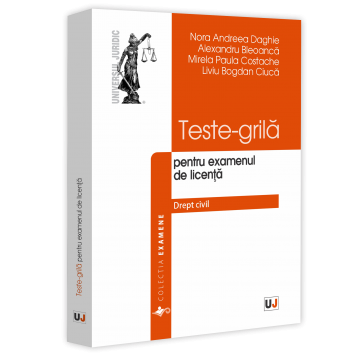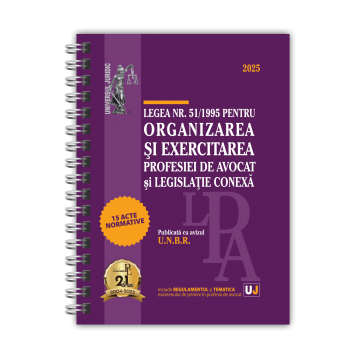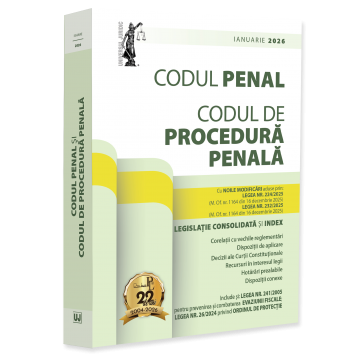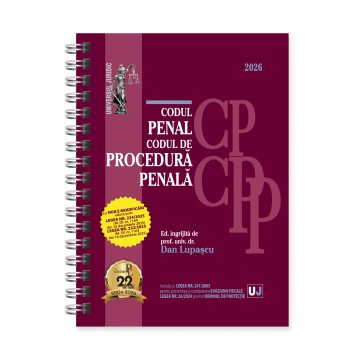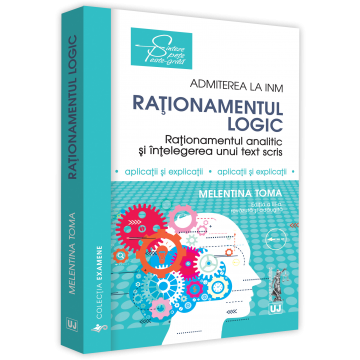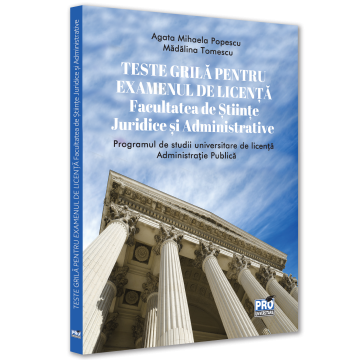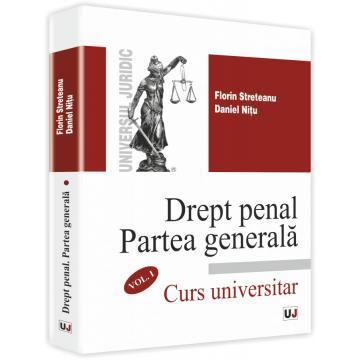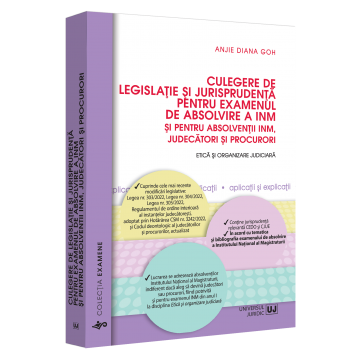Manuscript proposals: [email protected] / 0745 204 115 //// Tracking orders Individuals / Sales: 0745 200 357 / Orders Legal entities: 0721 722 783
6359.png) Forms of protection and promotion of Human Rights. Mediation and the Ombudsman - Claudiu Augustin Florinel Ignat
Forms of protection and promotion of Human Rights. Mediation and the Ombudsman - Claudiu Augustin Florinel Ignat
6359.png)
ISBN: 978-606-28-0491-6
DOI: 10.5682/9786062804916
Publisher year: 2016
Edition: I
Pages: 238
Publisher: Editura Universitară
Author: Claudiu Augustin Florinel Ignat
Product Code:
9786062804916
Do you need help?
0745 200 357
- Description
- Download (1)
- Authors
- Content
- More details
- Reviews (0)
The paper "Forms of Protection and Promotion of Human Rights: Mediation and the Ombudsman" is closely related to institutional efficiency and increasing transparency in the promotion and protection of human rights in the relationship between citizens and public institutions.
The research focused on the one hand, on the analysis of the Romanian and foreign specialized literature and of the legislation in the field of human rights protection, as well as on the European and national casuistry, realizing their approach from a social, legal point of view and a systemic comparison. methods of promotion and protection, and on the other hand, the research has an applicative side by analyzing the activity reports of the authorities, mainly the reports of the European Ombudsman and the People's Advocate, as well as statistics on mediation, regarding the effective protection of citizens' rights. , analysis of these reports on how mediation institutions and the ombudsman are effective.
Product compliance information
The research focused on the one hand, on the analysis of the Romanian and foreign specialized literature and of the legislation in the field of human rights protection, as well as on the European and national casuistry, realizing their approach from a social, legal point of view and a systemic comparison. methods of promotion and protection, and on the other hand, the research has an applicative side by analyzing the activity reports of the authorities, mainly the reports of the European Ombudsman and the People's Advocate, as well as statistics on mediation, regarding the effective protection of citizens' rights. , analysis of these reports on how mediation institutions and the ombudsman are effective.
-
Forme ale protectiei si promovarii Drepturilor Omului. Medierea si Ombudsmanul
Download
Claudiu Augustin Florinel Ignat
Content
Introductory considerations / 9
Introduction / 9
Purpose and object of research / 9
Scientific novelty of the obtained results / 10
Chapter I. Means of administrative, electoral and constitutional litigation for the protection of human rights / 19
Short presentation, types of contentious means, classification / 19
Comparative study between contentious means / 48
Chapter II. People's Advocate / 59
The evolution and history of the People's Advocate institution / 59
Principles governing the activity of the People's Advocate / 63
The People's Advocate in different international legal systems / 65
The People's Advocate in the Romanian legal system / 69
The role and competences of the Ombudsman in the European Union and in Romania / 72
Specific means of promoting and protecting human rights
by the People's Advocate / 76
The effects of the measures taken by the People's Advocate in the protection of Human Rights / 80
Chapter III. A.D.R.-ul. The A.D.R. in the system of international law / 92
Evolution and history / 92
The A.D.R. in the USA / 93
The A.D.R. in the European Union / 94
The A.D.R. in Romania / 96
The role and weight of A.D.R. in the promotion of Human Rights / 99
Comparison of A.D.R. with other institutions for the promotion and protection of Human Rights / 99
Chapter IV. Mediation / 112
Mediation - general part / 112
History and evolution / 112
Mediation in the USA / 115
Mediation in Asia / 117
Mediation in Europe / 119
Mediation in Romania / 120
The role of mediation in the promotion of Human Rights in the system of international law / 121
The role of mediation in the USA, Canada and Australia / 121
The role of mediation in Europe on promoting human rights / 122
The role of mediation in Romania regarding the promotion of Human Rights / 131
Specific means of promoting human rights through mediation. 135
Specific Means of Promoting Human Rights in the USA / 135
Specific means of promoting Human Rights in Europe and especially in the countries of the European Union / 136
Specific means of promoting Human Rights in Romania / 138
The advantages of mediation / 141
The advantages of mediation for the citizen / 141
The legal framework in the matter of mediation / 143
Principles of mediation / 149
Voluntary or voluntary nature of the mediation procedure / 149
Self-determination of parties in mediation / 150
Confidentiality of the procedure / 150
The principle / equality of the parties and the impartiality on the part of the Mediator / 151
The principle of neutrality / 152
The principle of acceptability / 152
The principle of prior information of the parties on the procedure / 153
Non-discrimination / 153
Conflict of interest / 153
Models and styles of cross - border mediation in the family field / 154
Tools / and / special / methodologies / in / the field of cross-border mediation regarding child abduction / / 155
Chapter V. The European Ombudsman / 171
Evolution and history / 171
Generic variants of the notion of Ombudsman / 174
Ways of working with the European Ombudsman / 180
Access to information / 187
Hearing of witnesses / 188
European mediator in the system of community law and in Romanian law / 190
The role of the European Ombudsman in the European Union / 194
The role of the European Mediator in Romania. / 198
Specific means of the European Ombudsman for the promotion and protection of Human Rights and the values protected by the legal systems of the member countries of the European Union, including Romania / 202
The effects of measures taken by the European Ombudsman to protect human rights / 205
Annual reports of the European Ombudsman / 210
Chapter VI. Conclusions and proposals of lege ferenda / 221
Conclusions and proposals of the law ferenda in the matter of the institution of the European Ombudsman or the European Ombudsman, as well as of the National Ombudsman / People's Advocate / 222
Conclusions / and proposals of the ferenda law in the Administrative Litigation / 223
Bibliography / 227
Introductory considerations / 9
Introduction / 9
Purpose and object of research / 9
Scientific novelty of the obtained results / 10
Chapter I. Means of administrative, electoral and constitutional litigation for the protection of human rights / 19
Short presentation, types of contentious means, classification / 19
Comparative study between contentious means / 48
Chapter II. People's Advocate / 59
The evolution and history of the People's Advocate institution / 59
Principles governing the activity of the People's Advocate / 63
The People's Advocate in different international legal systems / 65
The People's Advocate in the Romanian legal system / 69
The role and competences of the Ombudsman in the European Union and in Romania / 72
Specific means of promoting and protecting human rights
by the People's Advocate / 76
The effects of the measures taken by the People's Advocate in the protection of Human Rights / 80
Chapter III. A.D.R.-ul. The A.D.R. in the system of international law / 92
Evolution and history / 92
The A.D.R. in the USA / 93
The A.D.R. in the European Union / 94
The A.D.R. in Romania / 96
The role and weight of A.D.R. in the promotion of Human Rights / 99
Comparison of A.D.R. with other institutions for the promotion and protection of Human Rights / 99
Chapter IV. Mediation / 112
Mediation - general part / 112
History and evolution / 112
Mediation in the USA / 115
Mediation in Asia / 117
Mediation in Europe / 119
Mediation in Romania / 120
The role of mediation in the promotion of Human Rights in the system of international law / 121
The role of mediation in the USA, Canada and Australia / 121
The role of mediation in Europe on promoting human rights / 122
The role of mediation in Romania regarding the promotion of Human Rights / 131
Specific means of promoting human rights through mediation. 135
Specific Means of Promoting Human Rights in the USA / 135
Specific means of promoting Human Rights in Europe and especially in the countries of the European Union / 136
Specific means of promoting Human Rights in Romania / 138
The advantages of mediation / 141
The advantages of mediation for the citizen / 141
The legal framework in the matter of mediation / 143
Principles of mediation / 149
Voluntary or voluntary nature of the mediation procedure / 149
Self-determination of parties in mediation / 150
Confidentiality of the procedure / 150
The principle / equality of the parties and the impartiality on the part of the Mediator / 151
The principle of neutrality / 152
The principle of acceptability / 152
The principle of prior information of the parties on the procedure / 153
Non-discrimination / 153
Conflict of interest / 153
Models and styles of cross - border mediation in the family field / 154
Tools / and / special / methodologies / in / the field of cross-border mediation regarding child abduction / / 155
Chapter V. The European Ombudsman / 171
Evolution and history / 171
Generic variants of the notion of Ombudsman / 174
Ways of working with the European Ombudsman / 180
Access to information / 187
Hearing of witnesses / 188
European mediator in the system of community law and in Romanian law / 190
The role of the European Ombudsman in the European Union / 194
The role of the European Mediator in Romania. / 198
Specific means of the European Ombudsman for the promotion and protection of Human Rights and the values protected by the legal systems of the member countries of the European Union, including Romania / 202
The effects of measures taken by the European Ombudsman to protect human rights / 205
Annual reports of the European Ombudsman / 210
Chapter VI. Conclusions and proposals of lege ferenda / 221
Conclusions and proposals of the law ferenda in the matter of the institution of the European Ombudsman or the European Ombudsman, as well as of the National Ombudsman / People's Advocate / 222
Conclusions / and proposals of the ferenda law in the Administrative Litigation / 223
Bibliography / 227
INTRODUCTORY CONSIDERATIONS
Introduction
Introduction
The paper "Forms of Protection and Promotion of Human Rights: Mediation and the Ombudsman" is closely related to institutional efficiency and increasing transparency in the promotion and protection of human rights in the relationship between citizens and public institutions.
The research focused on the one hand, on the analysis of the Romanian and foreign specialized literature and of the legislation in the field of human rights protection, as well as on the European and national casuistry, realizing their approach from a social, legal point of view and a systemic comparison. methods of promotion and protection, and on the other hand, the research has an applicative side by analyzing the activity reports of the authorities, mainly the reports of the European Ombudsman and the People's Advocate, as well as statistics on mediation, regarding the effective protection of citizens' rights. , analysis of these reports on how mediation institutions and the ombudsman are effective.
The purpose and objectives of the research
Through this paper we want the in-depth research of the main theoretical and practical issues regarding the protection of the citizen's rights in public administration.
In achieving the proposed goal, we set ourselves the following objectives:
Analysis of the need and appearance of mediation and the People's Advocate, the main regulations adopted in Romania after 1990;
Establishing the content of the notions of "Mediation" and "People's Advocate";
Analysis of the main rights that are protected and promoted by the Mediation Institution and the People's Advocate Institution;
Establishing correlations between human rights, citizen's rights and methods of protection by the institutions of the People's Advocate and the institution of Mediation;
Identifying the ways of protection of human rights, as a result of the actions taken by: the People's Advocate and the Mediation institution;
Analysis of the steps initiated by the People's Advocate in support of the citizen as a result of the violation of his rights in the relationship with the administration;
The research also includes an analysis of the main regulations adopted at the level of the European Union regarding the institution of Mediation and the People's Advocate, as well as the identification of the ways through which human rights are protected and promoted in certain European states, through these institutions;
Emphasizing the idea that the protection of human rights, in any way, is a public issue, which involves compliance with a package of legal rules and measures aimed at fulfilling under the rule of legality and transparency all administrative acts that influence the life of the citizen, both when these are elaborated but also implemented;
Making recommendations and proposals for the law ferenda in order to create a coherent legislative framework for the efficient protection of the citizen's rights in the relations between him and the local and central public administration.
The scientific novelty of the obtained results
I consider that the topic of research on the protection and promotion of human rights is a topical issue at international, European and national level in the context of extending measures to ensure the protection of citizens against any form of abuse by local and central public administration, and thus tried identification of levers to ensure the citizen the right to good administration.
The number of legal norms has increased and implicitly the number of administrative acts to be issued to citizens is constantly increasing, as a result of the diversification of social and political life after 1990. Thus, the state, through its authorities, especially through public administration, must find optimal solutions for the provision of quality public services, but also new methods of promotion and protection of human rights through new efficient means, in this case the Mediation and the Ombudsman, to ensure the observance of the fundamental rights of the citizen both in the state of origin and as European citizen.
The research carried out took into account the analysis of the ways of achieving the protection and promotion of the citizen's rights, both by adopting some legislative provisions in this respect, and by the actions undertaken by the authorities.
Due to the fact that Romania is a member country of the European Union since 2007 when it joined the union, the regulations and measures adopted at this level must be taken over in national legislation, respectively in the practice of the authorities, bodies and courts involved in the activity of human rights protection.
Numerous reports on human rights in Romania were analyzed, respectively the Reports of the Romanian People's Advocate for I also include the reports of the European Ombudsman, all for the last 10 years, precisely in order to give a broad perspective on the cases approached over time by these two institutions, national and European.
Both the public administration at the central level and the public administration at the local level must contribute to the protection of human rights, as issuers of administrative acts, involve citizens in making decisions regarding their rights and provide citizens with access to information. preceding public, the elaboration, issuance and respectively the implementation of these administrative decisions.
In terms of applicability, the research serves as a source of information both for actors involved in the process of human rights protection, respectively public authorities, non-governmental bodies, civil society, and for those involved in the process of elaboration and adoption of normative regulations. .
Research methodology - the general objective of the research highlights the specific interaction between public administration, whether central or local, the legislative framework and society in the context of the evolution and expansion of human rights concerns, both nationally and internationally in the European Union.
The specific objectives of the research took into account the following considerations:
Clarification of important notions and concepts in the promotion and protection of human rights through mediation and through the institution of the Ombudsman;
Substantiation of the links between the Mediation institutions and the Ombudsman, with the citizen, direct beneficiary of the steps for the protection of his rights, related to the right of a good administration and a good governance;
Determining the stage and dynamics of the development of the protection and promotion of human rights through mediation and ombudsman at European and national level;
Analysis of the citizen's perception regarding the protection and promotion of his rights by the European Ombudsman and the Ombudsman;
Analysis of certain legislative provisions for the protection and promotion of human rights adopted in support of the mediation institution and the ombudsman as guarantors of the promotion of human rights in Romania and the European Union;
Analysis of the measures regarding the measures taken to protect human rights and to repair the damages that were created to the citizen through the acts and deeds of the public and central administration, respectively the action or inaction of the public administration at the moment of harming the fundamental rights of the citizen.
The research methods used to study the protection and promotion of citizens' rights in relation to public administration are represented by:
Historical method - was used to present the emergence of protection and promotion of human rights, as well as their historical evolution.
Analytical method - was used to collect the data necessary for the drafting of this scientific paper and took into account: legislation, doctrine, jurisprudence, research reports, activity reports of certain institutions, etc. to identify the theoretical and practical elements related to the studied topics.
Comparative method - is used to establish the main issues related to the promotion and protection of human rights in the legislation and at the level of various states in the European Union and their presentation by comparative method.
The predictive analysis of the evolution of administrative and legal realities between the citizen and the public administration, offers the possibility to formulate critical observations on the existing legal framework, the activities undertaken by the public authorities but also by the two institutions Mediation and Ombudsman, as well as lege ferenda.
The notion of human rights
The classical consecration of the notion of "human rights" is found in
The "Declaration of the Rights of Man and of the Citizen" of the French Revolution of 1789, which emphasized the importance of fundamental human rights and freedoms considered elementary in the development of society.
Human rights are "those prerogatives conferred by domestic law and recognized by international law on each individual, in his relations with the community and with the state, which give expression to fundamental social values and which aim to satisfy essential human needs and legitimate aspirations, in the economic-social, political, cultural and historical context of a certain society.
Today, the phrase "human law" is very common as a set of all legal rules aimed at protecting the individual as a subject of law better reflecting its legal status. Consecrated in the Constitution as well as in international human rights pacts and treaties, their importance in development is understood.
the area of our personality allowing us to use all our qualities for a better satisfaction of human needs. They emerged as a need felt by people to see the values and dignity of each individual protected and respected.
Fundamental human rights and freedoms can be classified by some criteria recognized by international documents - the Universal Declaration of Human Rights, the two Covenants on Civil and Political Rights and, respectively, economic, social and cultural rights of 1966, which divide their classification into two categories main: 1. civil and political rights and freedoms and 2. socio-political and cultural rights.
Civil rights ensure the individuality and originality of the subject of law in society. This category includes: the right to life, the right to private and family life, the right to the inviolability of the home, the right to marriage and to start a family, etc.
Political rights represent the possibility of the participation of the human individual in the administration of the state and society, the right to create unions, the right to choose and to be elected, etc.
Economic rights determine the economic side of natural human rights. This category includes the right to private property, the right to use and dispose of one's property, the right to own, etc.
Social rights related to the level of material development in a state, ensuring a decent standard of living and social protection of individuals through: the right to work, the right to housing, social insurance, the right to rest, etc.
Cultural rights include: the right to study, the freedom of literary, artistic, scientific creation, the right to use one's mother tongue, etc.
Another variant of classifying fundamental human rights and freedoms encountered in international practice is the existence of "three generations" of human rights.
The first generation is the core of human rights, considering fundamental civil and political rights. These include the right to life, the right not to be subjected to ill-treatment, the right to liberty, the right to respect for private and family life, the right to respect for correspondence, etc. The second generation includes social, economic and cultural rights in addition to civil and political rights such as the right to work, social security, the right to rest, etc. The rights of the third generation, also called collective rights, include international law, the right to peace, the right to disarmament, the right to development, the right to a healthy environment and the right of peoples to self-determination, and so on.
"The theory of human rights in the form we know today is anchored in the Renaissance and post-Renaissance humanistic conceptions, when the idea that man is born with rights inherent in his nature, that they are due to neither the divine will nor the human will, took shape. . In this way, human rights theory appears as an extension of the theory of subjective law and therefore of the theory of natural law. They are non-derived, unassigned rights, directly related to the very nature of man. In other words, their specificity results from the independence they have from any power, being prior to it, prior to positive law. All that power can do is not create them, but find them, protect and promote them, or violate them. To violate them means that the positive right is violated, a situation in which the power loses its very legitimacy.
The notion of good administration
If at first it seems simple to define the notion of good administration, it is not always so, because it is a relatively new concept, promoted by the proponents of the New Public Management, at the same time good administration is a fundamental right of the European Union and a principle. enshrined in the case law of the European Court of Justice. Good administration can also be an indicator of the performance obtained in the public administration, for this reason, as a concept, it was developed by the doctrine.
In an attempt to explain this concept as well as possible, we will use different means such as specialized studies or normative acts, so we will be able to approach good administration both from a doctrinal and legislative point of view. We will pay special attention to the definition of good administration at Community level, taking into account the following: European experiences in the field, the importance of the Ombudsman in promoting the right to good administration, the provisions of the European Code of Good Administrative Behavior, the Charter of Fundamental Rights The European Union, the jurisprudence of the European Court of Justice, the White Paper of the European Government, but also the documents of some supranational institutions that have influenced this concept such as the World Bank, the International Monetary Fund or the United Nations.
The importance of the principle of good administration, as it is rules
by the legislator through the provisions of Law no. 571/2004, also results from the fact that the legislator sanctions4, as disciplinary violations, contraventions or crimes. The regulation given by the above mentioned law, of the principle of good administration, is not a limiting one. In this regulation, we find elements of good administration and in the application of transparency in the public administration, in the administrative simplification, in the consultation of the citizens when making decisions, in the management of the material and financial resources of the community. We must mention that good administration is a right of the citizen and an obligation of the administration, but, in fact, good administration must represent the main objective of the activity of the local public administration.
The purpose of the local public administration is the realization of the public interest, for which the public services have been established and carry out their activity. Based on the principle of good administration, the activity of public administration must be carried out with efficiency, effectiveness and economy. Through this activity, the public administration must ensure that the needs of the citizens are met, offering quality public services. However, it is necessary for the citizen to be informed and where it is useful to participate in decision-making.
By transparency we mean the involvement of the public in the decision-making process and its access to information of public interest. Transparency also has certain limitations, such as the observance of confidential data by staff working with such data. Transparency also implies the obligation of public authorities to identify themselves to the people they interacted with. This obligation is intended to hold public administration staff accountable, because if a petitioner or a citizen feels harmed in his or her legitimate right or interest, he or she may sue the civil servant who does not respect his or her rights or even the institution to which he or she belongs, for non-fulfillment of service attributions, non-observance of the citizen's rights, or incompetence in the service.
We can also talk here about the European concept of good administration and the right to good administration. This concept of good administration was introduced with the initiation of reforms in public administration, central; new reforms appear related to a managerial way of thinking regarding the public administration system. The new Public Management has rethought the management of human resources regarding the introduction of more flexible working relationships and new pay methods, mobility schemes, managerial development plans and training programs, all with the aim of organizing on a single basis. plan of working conditions in the public sector with those in the private sector. These innovative ideas have been strongly supported by supranational bodies such as the World Bank, the International Monetary Fund or the OECD being particularly popular in Britain, the Scandinavian countries, the Netherlands, and countries with a more reserved opinion of this new management were France, Germany and Italy, as well as other countries in southern Europe, seem to have more reserves. These reservations were expressed mainly regarding the adaptation of the way of employment in the public sector, in general, to the way of employment in the private sector.
It is thus taken into account that the new managerial approach, being different from the old bureaucratic model, is not necessarily better and in the end, classical bureaucratic values, such as neutrality, stability, hierarchy and impartiality, are reduced to the level of relevance. if previously important.
For a good functioning of the modern administration, it must be based on the observance of some principles that should constitute permanent landmarks (standards) in the activity of the administration. For the European Union, there was a need to standardize and codify the main rules that must govern the administration-citizen relationship at the level of the European community.
For a better European administrative conduct, a European code was adopted in which this set of rules was concretized, which was conceived to a large extent at that time by the European Ombudsman at that time, Mr. Iacob Södermann and was adopted by the European Parliament on 6 October 2001. The Code sets out general principles of good conduct applicable to all relations between the Community institutions and their administrative services with the public. A consequence of the proclamation of the Charter of Fundamental Rights of the European Union The Code seeks to expose all European citizens to what they have the right to expect from the administration of the European Union and provides guidance to officials on how to behave in public relations.
The purpose of the local public administration is the realization of the public interest, for which the public services have been established and carry out their activity. Based on the principle of good administration, the activity of public administration must be carried out with efficiency, effectiveness and economy. Through this activity, the public administration must ensure that the needs of the citizens are met, offering quality public services. However, it is necessary for the citizen to be informed and where it is useful to participate in decision-making.
By transparency we mean the involvement of the public in the decision-making process and its access to information of public interest. Transparency also has certain limitations, such as the observance of confidential data by staff working with such data. Transparency also implies the obligation of public authorities to identify themselves to the people they interacted with. This obligation is intended to hold public administration staff accountable, because if a petitioner or a citizen feels harmed in his or her legitimate right or interest, he or she may sue the civil servant who does not respect his or her rights or even the institution to which he or she belongs, for non-fulfillment of service attributions, non-observance of the citizen's rights, or incompetence in the service.
We can also talk here about the European concept of good administration and the right to good administration. This concept of good administration was introduced with the initiation of reforms in public administration, central; new reforms appear related to a managerial way of thinking regarding the public administration system. The new Public Management has rethought the management of human resources regarding the introduction of more flexible working relationships and new pay methods, mobility schemes, managerial development plans and training programs, all with the aim of organizing on a single basis. plan of working conditions in the public sector with those in the private sector. These innovative ideas have been strongly supported by supranational bodies such as the World Bank, the International Monetary Fund or the OECD being particularly popular in Britain, the Scandinavian countries, the Netherlands, and countries with a more reserved opinion of this new management were France, Germany and Italy, as well as other countries in southern Europe, seem to have more reserves. These reservations were expressed mainly regarding the adaptation of the way of employment in the public sector, in general, to the way of employment in the private sector.
It is thus taken into account that the new managerial approach, being different from the old bureaucratic model, is not necessarily better and in the end, classical bureaucratic values, such as neutrality, stability, hierarchy and impartiality, are reduced to the level of relevance. if previously important.
For a good functioning of the modern administration, it must be based on the observance of some principles that should constitute permanent landmarks (standards) in the activity of the administration. For the European Union, there was a need to standardize and codify the main rules that must govern the administration-citizen relationship at the level of the European community.
For a better European administrative conduct, a European code was adopted in which this set of rules was concretized, which was conceived to a large extent at that time by the European Ombudsman at that time, Mr. Iacob Södermann and was adopted by the European Parliament on 6 October 2001. The Code sets out general principles of good conduct applicable to all relations between the Community institutions and their administrative services with the public. A consequence of the proclamation of the Charter of Fundamental Rights of the European Union The Code seeks to expose all European citizens to what they have the right to expect from the administration of the European Union and provides guidance to officials on how to behave in public relations.
We emphasize that this is a right of citizens and not a faculty of administration
nistratiei. When drafting the Code, of course, the principles of legality, non-discrimination, proportionality and lack of abuse of power were taken into account. As a result, in order to achieve a good administration, the local public administration relies on an appropriate legislative framework that allows it to act on the basis of law enforcement but also on an administrative component that must generate a managerial structure in order to promote progress. welfare and economic and social development of the local community.
The roots of the right to good administration are found in a number of Council of Europe resolutions, as well as in the jurisprudence of the European Court of Justice. The European Court of Justice of the European Union has systematized the classical or established principles, in order to ensure good administration: trust and predictability, openness and transparency, accountability, efficiency and effectiveness7. The role of the European Court of Justice in the evolution of legal principles has been essential8.
The roots of the right to good administration are found in a number of Council of Europe resolutions, as well as in the jurisprudence of the European Court of Justice. The European Court of Justice of the European Union has systematized the classical or established principles, in order to ensure good administration: trust and predictability, openness and transparency, accountability, efficiency and effectiveness7. The role of the European Court of Justice in the evolution of legal principles has been essential8.
The notion of maladministration
When we talk about a bad administration we refer to a bad administration that does not respect the norms in force and where it should be intervened in order to take measures and clarify the situation9. This notion is not defined by the statute or by the treaty, this task falls to the mediator. The mediator can give as an example of course: an administrative irregularity, an omission, an abuse of power, a negligence, a negligence, an illegal procedure, an injustice, a dysfunction, a lack of competence, a discrimination, a delay, an insufficiency or a refusal to provide information. Misconduct, illegalities and abuse combine perfectly in this equation of maladministration. As in domestic law, the notion of poor organization is difficult to define. In any case, the admissibility of complaints against political decisions is excluded, such as the position taken by the European Parliament on the issue of nuclear tests, carried out by France in the Pacific Ocean.
When it finds a mismanagement, the mediator seeks to find a way to remove the mismanagement and satisfy the request of the complainant. If the institution does not accept this solution, it formulates a draft recommendation for solving the problem. The body or institution concerned must respond within 3 months by a "detailed opinion". The Ombudsman shall draw up his report with any recommendations to the institution concerned and to the European Parliament. In case of failure, the Parliament has the obligation to start, any action that it considers viable in order to stop the persistence of the bad administration. Of course, the complainant is informed in advance about the progress and outcome of the mediator's intervention.
The Ombudsman may intervene in most cases of maladministration, but there are still exceptions such as:
Actions related to the exercise of the jurisdictional powers of the Court of Justice, the General Court and the Civil Service Tribunal of the European Union;
Actions of national courts or national mediators: The European Ombudsman is a court of appeal against decisions taken by these bodies;
Cases which have not previously been the subject of appropriate administrative measures within the bodies concerned;
Cases related to the labor relations between the bodies of the European Union and their personnel, unless the possibilities of internal requests and complaints have been exhausted;
Complaints concerning companies or individuals.
If you want to express your opinion about this product you can add a review.
write a review

![Forms of protection and promotion of Human Rights. Mediation and the Ombudsman - Claudiu Augustin Florinel Ignat [1] Forms of protection and promotion of Human Rights. Mediation and the Ombudsman - Claudiu Augustin Florinel Ignat [1]](https://gomagcdn.ro/domains/editurauniversitara.ro/files/product/large/forme-ale-protectiei-si-promovarii-drepturilor-omului-medierea-si-ombudsmanul-551-788456.jpg)
